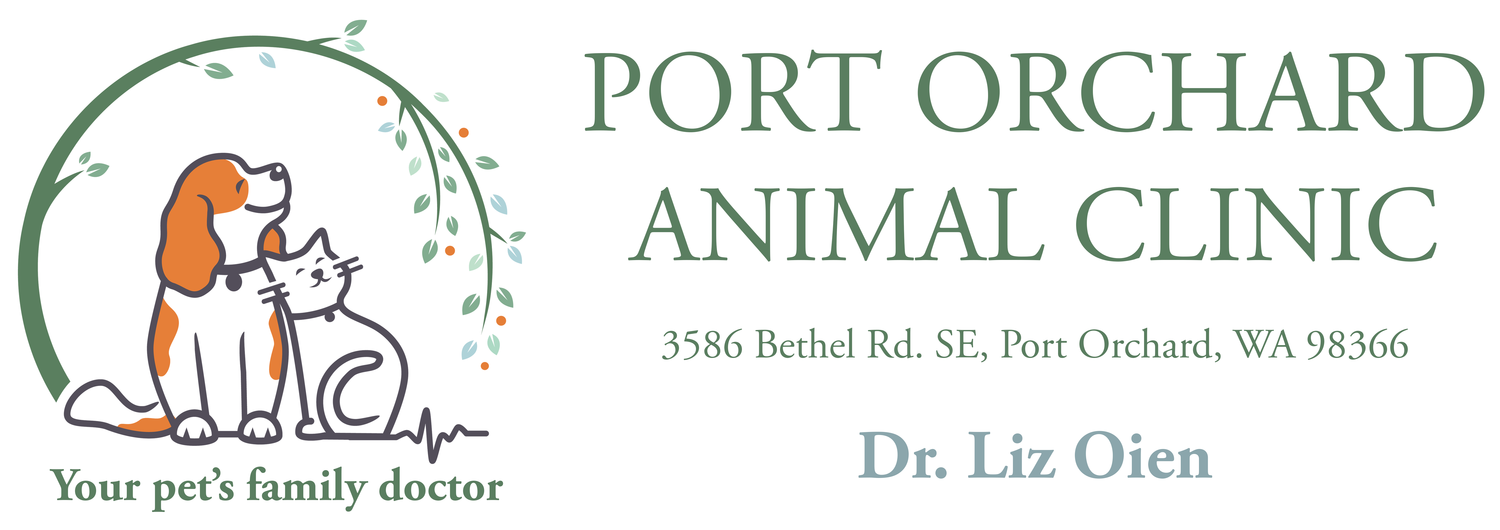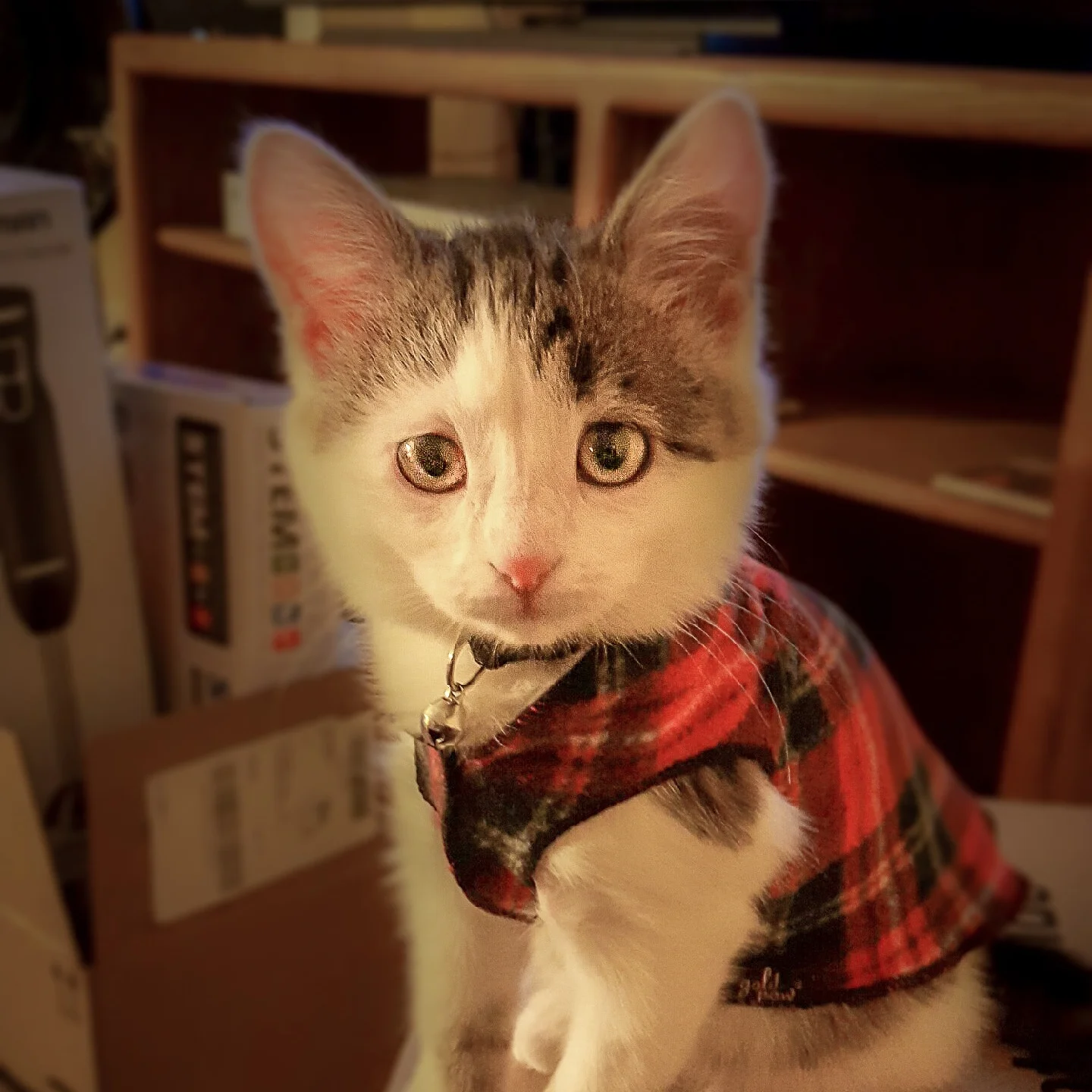The truth is, that unfortunately by the age of three, 80-85% of dogs and cats have dental disease. It’s important to remember that over 50% of dental disease is below the gum line. That’s the part we can’t see! Since our patients can’t tell us exactly what hurts, our team will assess their oral health during their annual wellness visits. Rest assured, Dr. Liz has received extensive training by a Board-Certified Dentist to grade, evaluate, and perform oral surgery.
Why come to our clinic for a dental cleaning?
Our dental appointments are comprehensive, compassionate, and at a reasonable cost.
- Your pet will be under anesthesia for the dental cleaning. This is the only method to clean all surfaces of the tooth and under the gingiva with an ultrasonic scaler and high-speed dental polisher. Maintaining anesthesia is considered the gentlest and kindest technique.
- Your pet will have pre-surgical lab work done to determine the health of their internal organs PRIOR to the dental cleaning. This is included in our dental cleaning cost.
- Dr. Liz Oien has received extensive dental training by board certified dentists. If your pet needs oral surgery, Dr. Liz will perform any necessary tooth removal.
- Our nurses are well trained in anesthesia and monitor your pet the entire time.
- Compassionate care includes gentle handling techniques, adequate pain control, and constant attention to detail.
- Our dental suite even includes lavender scented, warmed pillows and cozy beds and blankets for recovery!
What to expect during your pet’s dental procedure:
- Pre-operative lab work
- Anesthetics to help ensure comfort and safety during the entire procedure.
- Advanced digital radiology: Series of digital x-rays. These x-rays help us to diagnose the entire tooth structure.
- Knowledgeable veterinary professionals: Complete oral exam including charting the teeth and determining what treatments (if any) are required.
- Dental cleaning: Ultrasonic cleaning and polishing with a mint flavored polish.
- Recovery: Comfort is our top priority. One of our veterinary assistants/technicians will call you with an update and review any pertinent information with you.
- Discharge: we will provide you with additional information and tools to help you continue your pet’s oral hygiene at home.
The Top 5 Things You Can Do to Prevent Dental-Related Illness
What if you never brushed your teeth or went to the dentist?
Imagine the bad breath, tooth decay and infection you would be facing. The bacteria from your gums would migrate into the bloodstream and contaminate your internal organs.
Consider your pet's mouth…
If you are not brushing your dog or cat's teeth daily or using a dental preventative, they are reeling toward this same outcome. We meet pets every week in our clinic who have never had their teeth brushed at home, nor professionally cleaned by a veterinarian. They face losing their teeth because of intense infection and bone loss. Unfortunately, because we don’t catch periodontal disease soon enough, many also have heart, liver, or kidney disease as a complication of poor dental care.
Periodontal disease
Cats and dogs rarely develop tooth cavities as humans do. The most common dental problem that we find in pets is considered far worse. It is called “periodontal disease,” which means that the dental disease effects the gums and other tissues around the teeth, instead of the teeth themselves.
About 75% of all pet dental problems are a result of periodontal disease. It is also the cause of 95% of all cases of “bad breath.” In advanced cases, it results in infected, foul-smelling, loosened teeth with a massive, unsightly accumulation of tartar. Often there is a loss of appetite due to painful or infected gums. Signs such as diarrhea, vomiting, and irritability may be signposts of this disease.
Food material, bacteria, and saliva accumulate and adhere to the tooth surface, forming a soft “plaque.” This material can be easily removed when it first adheres to the tooth by proper tooth brushing. However, if buildup continues it becomes hard from its mineral content and is called "tartar." This tartar buildup causes erosion of the gums with subsequent inflammation and infection of the tooth socket and sometimes underlying bone. Teeth then become loose and may even fall out. Gums are reddened, swollen, and bleed easily. Ouch.
The buildup of this material allows bacteria to constantly grow in infected mouth tissue. Bacteria may enter the bloodstream through the bleeding gums and cause serious health problems like heart valve infections (endocarditic) and kidney infections (nephritis).
Rapid buildup of tartar is primarily due to acidity of the saliva, not what the pet eats. The more acidity in the saliva, the quicker the build-up of plaque.
THE GOOD NEWS
Periodontal disease is preventable with proper dental hygiene. Follow the steps below for good oral hygiene.
5 things you can do to prevent tooth-related health problems.
- The most important thing is to brush your dog’s teeth every day, using a veterinarian approved toothpaste. Human toothpaste often contains ingredients which are toxic to dogs and cats. Dr. Liz recommends the CET dental toothbrush and toothpaste, created just for pets, and would love to show you how to properly use it.
- Have your pet's teeth examined at least once a year for tartar buildup. Pets vary in the amount of tartar which accumulates (just like people). Dr. Liz recommends an annual dental check-up appointment to assess the health of your pet’s mouth and develop a treatment plan based on your pet's needs.
- Feed your pet a "dental diet" for their daily meal or as a treat. The surface of these specially formulated foods helps to reduce plaque buildup on the teeth, and they include enzymes to help rid the teeth of plaque. Dr. Liz recommends Royal Canin.
- Use a dental enzyme kit to reduce the acidity and bacteria within the mouth. Dr. Liz recommends Oratene. The kit includes a dental gel, water additive, and breath freshener.
- Dental chews are made with enzymes that help break down plaque-forming bacteria Dr. Liz recommends Oravet and/or CET dental chews.







